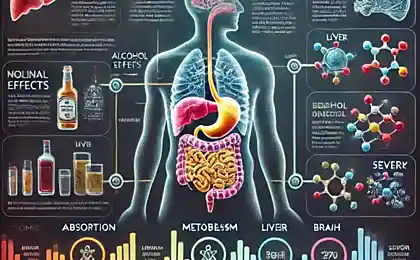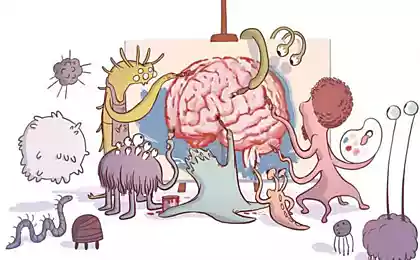486
Utilitarianism at the bottom of the glass: how alcohol affects the solution of ethical dilemmas
Ten million thirty six thousand three hundred ninety six
© Gabriel de Santis
Graduate students often for research purposes conducting silly experiments. For example, what could be more inappropriate for such a situation: a young researcher walks into a bar in Grenoble, chooses as a "victim" of some moderately drunk person, comes to him and says: "Look, it may seem weird to you, but would you care to answer some philosophical questions?»
It was engaged in one poor graduate student who interviewed a large part of the subjects for recent studies of the effects of alcohol on the ethical decision-making. This was carried out two separate experiments in which visitors to the bar were asked to answer philosophical questions and to make a decision. In total, the experiment involved 102 people (both men and women). One participant was eliminated from the experiment because clearly followed the instructions. Surprisingly, he was the only one, given the fact that all subjects were drunk. After interviewing the participants took a test to determine the level of alcohol in the blood, so the researchers were able to assess the degree of their intoxication.
Subjects were asked to solve two popular philosophical puzzles: the "trolley problem" and its variation, "the problem of the fat person". In the first case in the States, what on rails with great speed rushing heavy trolley while on her route tied to the rails five people. While it is possible to flip a switch and the trolley will roll on the siding, but it will crush the other person, also tied to the rails. People have to make a choice: to intervene and save the lives of five cost the lives of one or to remain uninvolved. In the second variant of this dilemma role plays fat arrows, which you push from the bridge on the rails to prevent the trolley to kill the others. Both puzzles were accompanied by illustrations to facilitate the understanding of the conditions, because all the subjects were drunk, so there was a possibility that they will not be able to read the text.
"The higher was the content of alcohol in blood a person has, the more resolute was he in his intention to kill one hypothetical person for the sake of a hypothetical majority»
"The idea was to study the effect of alcohol on decision-making from the point of view of morality and ethics," commented Aaron Duke, one of the authors of the study. His group found the subjects, the dependence of the desire to switch the arrow or push the man on the rails to the degree of intoxication. The higher the content of alcohol in blood a person has, the more resolute was he in his intention to kill one hypothetical person for the sake of a hypothetical majority. This choice fits perfectly into the philosophy of utilitarianism: that of saving the five people is more of good than of evil from killing one person.
"These results call into question the assertion that utilitarian views are purely the result of better reasoning," — says Aaron Duke, a psychologist at Yale University and co-author of the article with the wonderful title "the Drunk benthamite: the concentration of alcohol in the blood determines a utilitarian approach to issues of morality."
The assertion that alcohol turns people into emotionally balanced rationalists, ready to do anything for saving lives, seems ridiculous. However, Duke and his colleague Laurent Jogging not trying to prove that people in a state of intoxication certainly are outstanding philosophers and logicians. The results of the study rather questioning the General postulates about how people make decisions.
"About the correctness of utilitarian moral argue, but it is believed that it is inherent in a less emotional people. The study showed that this is not always the case," says the Duke.
One explanation proposed by the Duke, suggests that people in a condition of alcoholic intoxication are less sensitive to what is happening with the person who is on the tracks or on the bridge: "seems like a reasonable explanation: alcohol reduces emotional sensitivity toward someone else's pain". According to the scientist, the study highlights the complexity and neodnoznachnosti the problem of choice: "ethical decision-Making can be influenced just from a substance. This shifts the ethical framework through which we see the world".
Duke also recognizes that the research results not enough significant, largely due to the small sample size. In addition, there are shortcomings in themselves posed the questions.
"People approach "trolley problem" with extreme seriousness, although this is just a funny assumption, says Duke. I don't know whether the drunk people to this problem with less severity, but alcohol may greatly simplify the situation. People can ask themselves those questions on which the task".
In other words, the alcohol contributes to the fact that people simply perceive the situation, when any graduate student asks them to participate in a thought experiment with killing people. Perhaps, for the philosopher-researcher a drunk person is just a dream, no matter the benthamite or not.
Source: theoryandpractice.ru
© Gabriel de Santis
Graduate students often for research purposes conducting silly experiments. For example, what could be more inappropriate for such a situation: a young researcher walks into a bar in Grenoble, chooses as a "victim" of some moderately drunk person, comes to him and says: "Look, it may seem weird to you, but would you care to answer some philosophical questions?»
It was engaged in one poor graduate student who interviewed a large part of the subjects for recent studies of the effects of alcohol on the ethical decision-making. This was carried out two separate experiments in which visitors to the bar were asked to answer philosophical questions and to make a decision. In total, the experiment involved 102 people (both men and women). One participant was eliminated from the experiment because clearly followed the instructions. Surprisingly, he was the only one, given the fact that all subjects were drunk. After interviewing the participants took a test to determine the level of alcohol in the blood, so the researchers were able to assess the degree of their intoxication.
Subjects were asked to solve two popular philosophical puzzles: the "trolley problem" and its variation, "the problem of the fat person". In the first case in the States, what on rails with great speed rushing heavy trolley while on her route tied to the rails five people. While it is possible to flip a switch and the trolley will roll on the siding, but it will crush the other person, also tied to the rails. People have to make a choice: to intervene and save the lives of five cost the lives of one or to remain uninvolved. In the second variant of this dilemma role plays fat arrows, which you push from the bridge on the rails to prevent the trolley to kill the others. Both puzzles were accompanied by illustrations to facilitate the understanding of the conditions, because all the subjects were drunk, so there was a possibility that they will not be able to read the text.
"The higher was the content of alcohol in blood a person has, the more resolute was he in his intention to kill one hypothetical person for the sake of a hypothetical majority»
"The idea was to study the effect of alcohol on decision-making from the point of view of morality and ethics," commented Aaron Duke, one of the authors of the study. His group found the subjects, the dependence of the desire to switch the arrow or push the man on the rails to the degree of intoxication. The higher the content of alcohol in blood a person has, the more resolute was he in his intention to kill one hypothetical person for the sake of a hypothetical majority. This choice fits perfectly into the philosophy of utilitarianism: that of saving the five people is more of good than of evil from killing one person.
"These results call into question the assertion that utilitarian views are purely the result of better reasoning," — says Aaron Duke, a psychologist at Yale University and co-author of the article with the wonderful title "the Drunk benthamite: the concentration of alcohol in the blood determines a utilitarian approach to issues of morality."
The assertion that alcohol turns people into emotionally balanced rationalists, ready to do anything for saving lives, seems ridiculous. However, Duke and his colleague Laurent Jogging not trying to prove that people in a state of intoxication certainly are outstanding philosophers and logicians. The results of the study rather questioning the General postulates about how people make decisions.
"About the correctness of utilitarian moral argue, but it is believed that it is inherent in a less emotional people. The study showed that this is not always the case," says the Duke.
One explanation proposed by the Duke, suggests that people in a condition of alcoholic intoxication are less sensitive to what is happening with the person who is on the tracks or on the bridge: "seems like a reasonable explanation: alcohol reduces emotional sensitivity toward someone else's pain". According to the scientist, the study highlights the complexity and neodnoznachnosti the problem of choice: "ethical decision-Making can be influenced just from a substance. This shifts the ethical framework through which we see the world".
Duke also recognizes that the research results not enough significant, largely due to the small sample size. In addition, there are shortcomings in themselves posed the questions.
"People approach "trolley problem" with extreme seriousness, although this is just a funny assumption, says Duke. I don't know whether the drunk people to this problem with less severity, but alcohol may greatly simplify the situation. People can ask themselves those questions on which the task".
In other words, the alcohol contributes to the fact that people simply perceive the situation, when any graduate student asks them to participate in a thought experiment with killing people. Perhaps, for the philosopher-researcher a drunk person is just a dream, no matter the benthamite or not.
Source: theoryandpractice.ru























